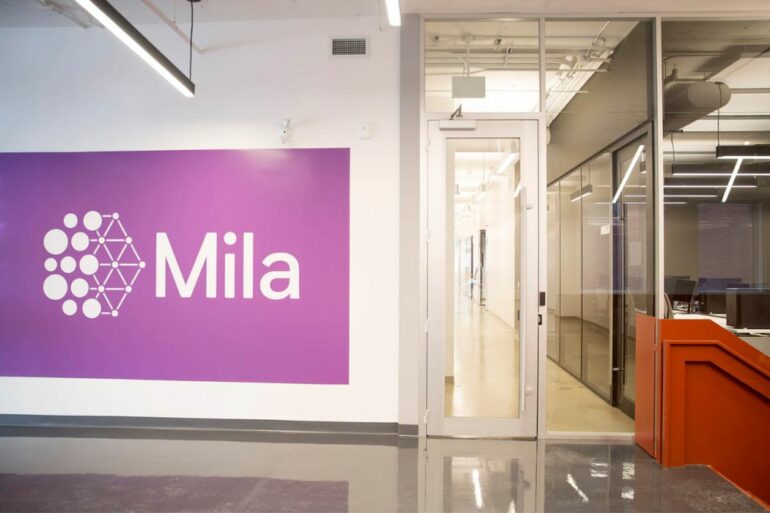KPI Mining Solutions is partnering with Québec AI Institute Mila to develop artificial intelligence (AI) and machine learning (ML) modelling in the hopes of advancing mining efficiency. Those intended efficiency gains include reducing the environmental impact of mining and supporting Canada’s strategy in the sector.
“Critical minerals play a crucial role in driving the electric vehicle transition and supporting the climate agenda and AI has proven to be an important technology in the support of Canada’s critical mineral strategy,” said Stéphane Létourneau, executive vice-president of Mila.
“Critical minerals play a crucial role in driving the electric vehicle transition and supporting the climate agenda.”
– Stéphane Létourneau,
Mila
Founded by Professor Yoshua Bengio of the University of Montreal, Mila is an AI research institute that brings together over 1,000 researchers specializing in machine learning.
KPI describes itself as a global software development and consulting firm. It offers consulting services across mining, supply chains, manufacturing and transportation, according to the firm. Combining deep learning (DL) with operations research (OR), KPI carries out strategic mine planning, scheduling, and design; risk assessment; and simulation algorithms.
“We are very excited to partner with Mila, a world-leading institution in AI/DL research,” said Benny Cohen, President of KPI Mining Solutions. “We deliver integrated simultaneous (mines to products to markets) AI plus OR optimization models, dealing with multiple uncertainties. Our collaboration with Mila enables us to leverage and enhance the power of AI in our software.”
Québec and Mila are not the only province and AI institute looking toward the mining sector. The Ontario government is providing a combined $77-million investment to the Vector Institute for Artificial Intelligence and the Ontario Centre of Innovation (OCI) to fund programming that aims to advance the province’s tech sector.
According to the Ontario government, its investment into OCI will be used to launch new initiatives that will help small and medium-sized Ontario businesses develop “critical technologies” in sectors like mining, agrifood, and advanced manufacturing.
Mining is becoming an increasingly important topic in tech following United States (US) President Joe Biden’s visit to Canada in 2023, where he and Prime Minister Justin Trudeau vowed to work together to create a strong, environmentally responsible, and resilient North American critical minerals supply chain. The Canadian government’s semiconductor investments are about positioning Canada as a key player in this strategic industry.
Canada committed to provide up to $240 million CAD for semiconductor projects in 2022. As part of the Canada-US agreement, with the passage of the CHIPS and Science Act, Canada and the United States will facilitate investment to promote secure and resilient semiconductor supply chains, creating jobs in both countries.
It’s also led to a rush of announcements such as Ottawa-based Ranovus securing $36 million CAD through the Canadian federal government’s Strategic Innovation Fund. The funds will help support a $100 million project to advance domestic production and manufacturing of semiconductor products and services.
Nor are semiconductors the only factor driving mining. Mangrove Lithium received a $10 million USD ($12.6 million CAD) Series A round in 2021 to address the emerging deficit of high-purity lithium needed for electric vehicle batteries.
The company will use the investment to build its first commercial-scale plant with the intention of expanding lithium refining capacity in the Western hemisphere.
Mila will bring AI and ML to bear on mining to support the country’s critical mineral strategy.
In March 2022, Mila had also announced a partnership with Twitter to enhance the social media platform’s use of ML. A spokesperson for Twitter told BetaKit at the time—before Elon Musk took over ownership of the company—that there was a financial component to the deal, which would go towards various supporting research projects, events, internships, and other Mila activities. The spokesperson did not disclose the amount to BetaKit.
However, in response to a query from BetaKit, Ludovic Soucisse, Mila’s director of communications and public affairs, said on Aug.21, “Unfortunately, since the acquisition of X (formerly Twitter) by Elon Musk, there have been no collaborations or projects between our two organizations.”
Musk acquired the company in April 2022, and officially took over as owner and then-CEO on Oct. 27, 2022.
“Mila does not consider X (or Twitter) as a partner anymore,” Soucisse said.


